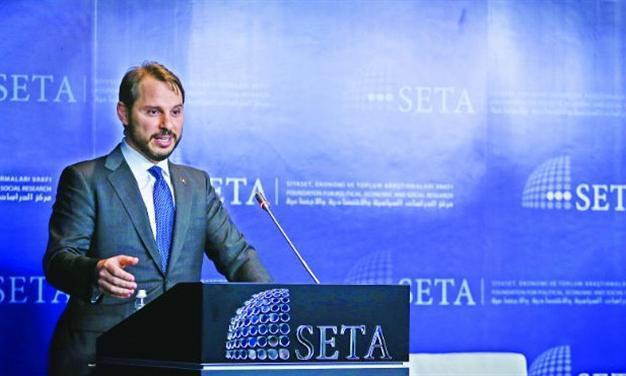Turkish gov’t works on a separate coal law: Minister
Abdülkadir Selvi-ANKARA

AA photo
The Turkish government is currently working on a coal law that will enhance labor safety, accelerate projects increasing the use of local coal reserves and attract more investment to the sector, said Energy Minister Berat Albayrak.“In many countries there is a separate coal law rather than a mining law. We have started to work on a separate coal law and we will put it on the agenda very soon. We have been preparing a coal law that will regulate various parts of coal mining, from methane gas drainage to labor safety and worker health by considering the highest standards in labor safety,” he said in a meeting with a group of journalists in Ankara.
He noted that one of the ministry’s main aims was to make it easier to invest in the sector and to develop solutions to the sector’s problems.
“All potential investors want to go through the investment process by facing the least bureaucratic burdens. We want to make the process much easier for them,” he said.
According to the 2016 Budget Presentation of the Energy Ministry, Turkey can save around $7.2 billion from its annual energy bill as long as the country’s coal reserves are fully realized.
Albayrak also said nuclear power is another must for Turkey, which is highly dependent on foreign energy resources to meet its increasing demand.
‘Irrational not to use nuclear energy’
“We want to maximize supply security. There are more than 450 nuclear power plants currently in operation across the world and 100 new power plants are under construction. It is irrational for Turkey to not use nuclear energy,” he said. He added that it cannot be ignored that many nuclear power plants are under construction currently, despite the Fukushima disaster, because many additional safety measures are taken now.
Discussing the first planned nuclear power plant project, Albayrak said both Turkey and Russia fulfilled their responsibilities.
He noted that his recent China visit played a key role in furthering the third planned nuclear power plant project.
“We have decreased the number of potential locations for the third nuclear power plant to 10-15 in line with 18 criteria, including the proximity to water sources, earthquake sites or bird migration routes,” he said, adding that the ministry’s priority is to realize the two existing power plant projects after completing environmental and legal requirements.
Turkey and Japan signed a host government agreement in October 2013 for the construction of Turkey’s second nuclear power plant in the Black Sea province of Sinop.
Ownership of the 4,800 MWe plant will be split between a consortium of Japan’s Mitsubishi and Itochu, and France’s Areva and GDF Suez, with 65 percent, and Turkey’s state-run power producer EÜAŞ, with 35 percent. Areva and Mitsubishi will supply four Atmea 1 reactors.
















